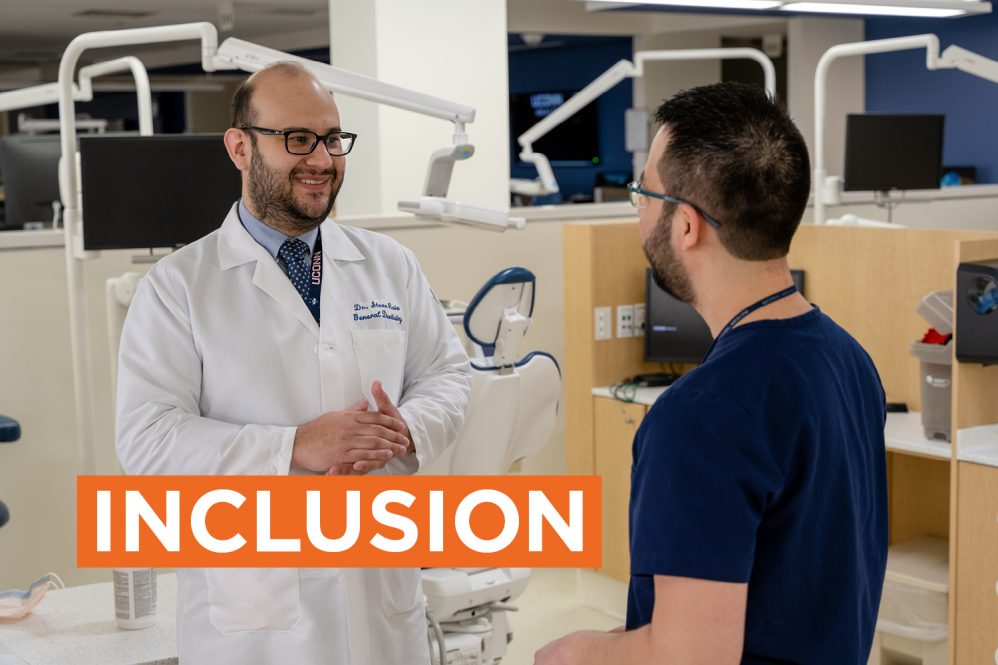Inclusion is the practice or policy of providing equal access to opportunities and resources for people who might otherwise be excluded or marginalized, such as those who have physical or intellectual disabilities and members of other minority groups.
Dr. Steve Ruiz, director, Advanced Education in General Dentistry, UConn School of Dental Medicine explains that inclusion means to “include everyone, that simple.”
“There should be no barriers that exclude anyone based on their race, gender, ability, religion, etc.,” says Ruiz.
Ruiz completed his residency at UConn Health in 2014 and began his faculty career here in 2017. He has been in his current role as program director for the Advanced Education in General Dentistry (AEGD) residency since 2021.
UConn School of Dental Medicine’s patient care system focuses on inclusion and is committed to providing inclusive, high-quality dental care to patients with special healthcare needs during which they feel comfortable and safe.
“Inclusion in healthcare means no barriers, that we include accommodations for all cultures, physically welcoming spaces and making patients part of the decision process,” says Ruiz.
The academic programs at the dental school educate the future work force to understand inclusion and the dental students have taken this to heart with their many community projects that focus on inclusion.
“UConn School of Dental Medicine has done an excellent job in this regard,” says Ruiz. “The students are exposed to a significant amount of didactic knowledge, but most important of all the students are INVOLVED and are able to witness things firsthand. They participate and organize many outreach activities all year long with genuine interest.”
Last month, the UConn School of Dental Medicine Special Care Dentistry Interest Group (SCDIG) hosted their annual Week of Inclusion to show support, learn, and discuss the importance of inclusion and connection for people with intellectual and developmental disabilities in dentistry.
To honor this year’s theme, Going All [In]clusive, the students planned activities such as interactive and engaging posts on social media, an American Sign Language Workshop and an initiative to sign a pledge were among some of the awareness activities that anyone could participate in to help expand their reach to other departments within UConn Health and the UConn School of Dental Medicine.
“This week showed us how our dental clinic and dental school abundantly support the message of inclusion,” said Samantha Sheppard, third-year student and treasurer. “Patients with special healthcare needs (SHCN) often have more unmet dental needs due to multiple barriers to care that they face. Our goal for the week was to encourage everyone who is involved in patient care to advocate for this population and continuously educate themselves on ways to support the SHCN community. We are all capable of making an impact through our care!”
“Dentistry is always changing from composites to dental implants,” says Ruiz. “Access to dental care for many patient populations is still a major issue, but thankfully that’s changing and improving. The School of Dental Medicine has partnerships with community healthcare clinics all around CT that helps bridge that gap.”
One of those partnerships is with Connecticut Mission of Mercy (CT MOM). This year the free dental clinic took place for the first time on UConn Health’s campus, serving over 1,000 patients in need during the two-day event that provides free dental services for underserved and uninsured individuals who cannot afford the cost of care. Among those who volunteered for this event were UConn students, residents, faculty and staff.
“We are fortunate to have a very diverse resident population that allows us to better reach out to marginalized or underrepresented patient populations,” says Ruiz. “We learn a lot from working with the students and what the new generations’ needs are and in some respects the students lead the way.”



